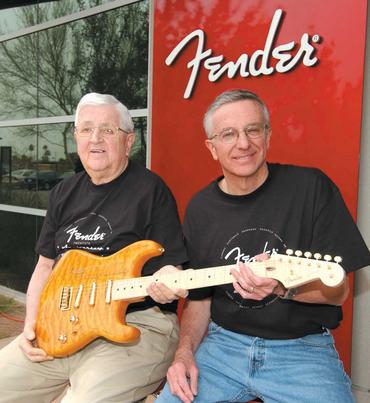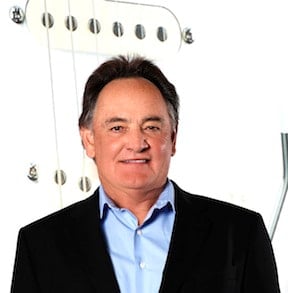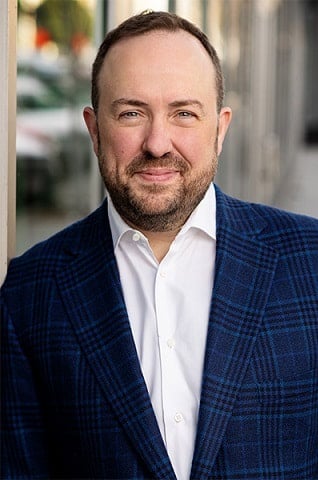THE WESTON PRESIDIO ERA
|
In December 2001, private equity firm Weston Presidio acquired a controlling stake in the company for $57.8 million.
Just few years later, in 2005, Bill Schultz (who died in 2006) retired and Bill Mendello, already manager under CBS, became the new CEO of FMIC. Soon after the other big protagonist of 1985 buyout, Dan Smith, retired, (he died on September 28, 2016). Smith and Schultz's contribution to Fender, however, can’t be forgotten: had it not been for them, it is likely that the company that invented the Stratocaster would not exist today. At the beginning of 2008, FMIC acquired Kaman Music Corporation (KMC), the largest independent distributor of musical instruments in the United States, which produced or distributed brands as Ovation, Takamine, Hamer, Latin Percussion, Gretsch Drums, Gibraltar Hardware, Toca Percussion, Sabian Cymbals and Genz Benz amplifiers. |
Old Fender's sales director, Don Randall, the man who gave the name to Stratocaster, died on December 23 of that year.
|
In 2010 Mendello retired too and was replaced by Larry Thomas, who joined the Fender Musical Instruments Corporation board in 2009. Larry is remembered for having revisited American Vintage and introduced American Select. He played a key role in the management of the American Design Experience and established FMIC’s first direct office in China. In September, 2011, Thomas opened the 8,400-square-foot Visitor Center at the Corona factory to pay tribute to the company's legacy.
In March 2012, Fender announced plans for an initial public offering (IPO), which would’ve secured Weston Presidio more than $50 million. |
The IPO was withdrawn five months later after potential investors expressed concerns over the company’s debt load and a poor outlook for the future of musical instruments, as Larry Thomas said in a statement: “Current market conditions and concerns about economic conditions in Europe do not support completing an initial public offering at what we believe to be an appropriate valuation at this time.”
As of July 10, 2012, the majority shareholders of Fender were the private equity firm of Weston Presidio (43%), Japanese music distributors Yamano Music (14%) and Kanda Shokai (13%), and the longtime investor Servco Pacific (5%).
As of July 10, 2012, the majority shareholders of Fender were the private equity firm of Weston Presidio (43%), Japanese music distributors Yamano Music (14%) and Kanda Shokai (13%), and the longtime investor Servco Pacific (5%).
Servco / TPG Growth ERA
In the fall of 2012, Servco – with TPG Growth as an equal-stakes partner – purchased Weston Presidio’s shares in Fender, and with that, a co-ownership stake in the brand.
In the same year, Fender moved its direction to Scottsdale Perimeter Centre and in 2014 sold the historic Guild acoustic guitar brand to the Cordoba Music Group.
In May 2014 Fender CEO Larry Thomas, 64, retired from FMIC. “I am extremely proud of the success we have achieved in my time at Fender,” said Thomas. “We did a lot in just a few years and I leave feeling like our table is set for the company’s future direction. This has truly been a wonderful life experience. FMIC is a wonderful company and Fender is a great brand, and I am very thankful to have played a part in the company’s history.”
Scott Gilbertson, Fender interim chief operating officer since October 2013, assumed the role of interim CEO while the company searched for Thomas' successor.
In the same year, Fender moved its direction to Scottsdale Perimeter Centre and in 2014 sold the historic Guild acoustic guitar brand to the Cordoba Music Group.
In May 2014 Fender CEO Larry Thomas, 64, retired from FMIC. “I am extremely proud of the success we have achieved in my time at Fender,” said Thomas. “We did a lot in just a few years and I leave feeling like our table is set for the company’s future direction. This has truly been a wonderful life experience. FMIC is a wonderful company and Fender is a great brand, and I am very thankful to have played a part in the company’s history.”
Scott Gilbertson, Fender interim chief operating officer since October 2013, assumed the role of interim CEO while the company searched for Thomas' successor.
 Andy Mooney
Andy Mooney
In 2015 Andy Mooney, Scottish by birth, became the new CEO in place of Gilbertson. Mooney joins FMIC from Quicksilver, Inc. and brings significant experience growing global brands such as Disney Consumer Products (DCP) and Nike. Mooney has been a player, studying classical guitar in grade school, and collected Fender guitars and amps for more than 40 years. Mark Fukunaga, chairman and CEO of Servco Pacific and co-chair of the FMIC board of directors declared: “Andy has proven success in connecting consumers to brands. His personal passion for Fender guitars and the company's long and storied history makes him a great fit for our culture. We are tremendously excited to have an executive of Andy's caliber at the helm of Fender and we look forward to great success in the future under his leadership.”
In 2015, Fender kicked off a direct-to-consumer approach for sales of its instruments and electronic products. In doing so, it created a more conducive and accessible retail experience for consumers.
It followed up with a digital learning platform, Fender Play, and practice app, Fender Songs, launched in 2017 and 2019 respectively, making it easier for newbies to pick up – and continue with – the instrument. The brand also launched the Fender Flagship eCommerce store on Alibaba Group’s Tmall Global to capitalise on China’s burgeoning music scene.
Fender announced its Fender Next program in 2019 as a platform to recognize up-and-coming talent in the music scene like Christone ‘Kingfish’ Ingram, Larkin Poe, Ashley McBryde, and Tom Misch, expanding its focus beyond its legacy generation to include younger and trendier audiences. The brand has also actively sought out more female artists to include in its roster.
In 2015, Fender kicked off a direct-to-consumer approach for sales of its instruments and electronic products. In doing so, it created a more conducive and accessible retail experience for consumers.
It followed up with a digital learning platform, Fender Play, and practice app, Fender Songs, launched in 2017 and 2019 respectively, making it easier for newbies to pick up – and continue with – the instrument. The brand also launched the Fender Flagship eCommerce store on Alibaba Group’s Tmall Global to capitalise on China’s burgeoning music scene.
Fender announced its Fender Next program in 2019 as a platform to recognize up-and-coming talent in the music scene like Christone ‘Kingfish’ Ingram, Larkin Poe, Ashley McBryde, and Tom Misch, expanding its focus beyond its legacy generation to include younger and trendier audiences. The brand has also actively sought out more female artists to include in its roster.
SERVCO PACIFIC TAKEOVER
With a press release in January 2020, Fender announced that longtime investor Servco will be securing a majority stake in a purchase agreement with TPG Growth and that the acquisition will take place in February. Andy Mooney noted the milestones Fender had reached under the joint ownership, saying: “We thank TPG Growth for their contribution on multiple levels, both strategic and tactical, and for their support in expanding into digital products and services.” Mooney also made it clear that the change in ownership wouldn’t affect the makeup of Fender’s current management: “On an operational level, all will remain the same. Fender will continue with the same exceptional management team who all have been instrumental in our recent growth. We look forward to extending FMIC’s long term relationship with Servco who share our core mission to support artists and players at every stage in their musical journey.”
The COVID19 pandemic, which started in 2020, led many industries to shut down production. It was at first seen as a potential death knell into what was already a declining guitar market. Instead, this gave Fender's sales a surprisingly significant bump. The result is that Fender has sold more guitars in 2020 than any other year in its history.
The COVID19 pandemic, which started in 2020, led many industries to shut down production. It was at first seen as a potential death knell into what was already a declining guitar market. Instead, this gave Fender's sales a surprisingly significant bump. The result is that Fender has sold more guitars in 2020 than any other year in its history.
|
In 2022 Matt Janopaul was appointed Chief Financial Officer of Fender Musical Instruments Corporation. He succeeded outgoing CFO Jim Broenen, who served in the role for the previous 13 years. Janopaul was Managing Director of Servco Pacific Capital. He first began working closely with Fender’s management team in 2001, when he was a partner at private equity firm Weston Presidio and then a Fender investor. In 2005 he jumped to join Fender for a period and held various roles, including President and Chief Operating Officer. A new CFO would allowed Fender to consider strategic opportunities that private equity would typically shy away from: “It’s to have a CFO in the company that is really going to think about it long-term and that, more importantly, [knows] the history of where the company has been and what it’s capable of going forward,” declared Matt.
|
Antonio Calvosa






